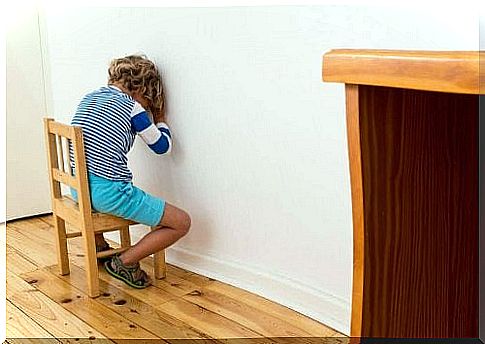Five Alternatives To Punishing Your Child

Did you know that punishment is not the only way to teach your child a lesson? There are alternatives to punishment that promote better child development.
Several psychologists agree that yelling or slapping only works in the short term. Since these do not change the indecisive behavior of the child, they also directly affect his emotional health.
In this article, discover 5 alternatives to punishing your child that will help teach your child better.
Remember how you felt every time your mom or dad yelled at you for not cleaning up your toys? Or the times you cried because you were physically punished? That’s exactly what your child feels when you punish him by using verbal or physical aggression.
Although your intention is to change your child’s behavior , this kind of punishment only makes him feel humiliated. With that strategy, he won’t learn the good behavior you want him to learn. He will only do things to avoid name-calling and he will see violence as a means of solving problems.
What are the best alternatives to punishing your child?

Talking is one of the best alternatives to punishment to correct inappropriate behavior in your child. However, sometimes it is not enough. You should also consider educational alternatives and positive reinforcement so that the child is able to understand why his behavior is wrong. That way he can change it.
Some people suggest other forms of reprimand, such as taking away privileges. However, these punishments convey the same messages as physical reprimands.
Really effective alternatives to punishment are those where the child learns to learn from his mistakes and he can grow in a healthy way.
Positive discipline is more beneficial to the parent-child relationship, as long as it is based on love and mutual respect. That doesn’t mean you have to give in to your child’s whims, but it’s also not about being overly authoritarian.
It’s about maintaining your point of view while looking at your child’s feelings and needs, as well as yours as a parent.
1. Talk to your child and solve the problem
Many parents find it difficult to talk to their children without the conversation turning into a discussion. This usually happens when the child needs help but refuses to talk to their parents.
An alternative to punishment is to listen to your child and let him express himself. Don’t get ahead of yourself by telling him you know how he feels.
Many conversations end in a discussion because parents speak up before they should, making the child feel like he hasn’t made his point clear.
Even though you know what might be going on in your child’s mind, speak up curiously about what he shares with you. This way, he feels confident and ready to talk to you about what’s happening. Once he opens up to you, you will be able to find a solution to the problem together.
2. Explain the consequences of his actions

Words make a difference. Telling your child things like, “If you do this, I’ll make you regret it,” will only make him afraid of you, it won’t make him respect you. This also doesn’t teach him what behavior to change.
Talk to your child. Make him understand that his actions have consequences. Make him understand that these consequences can affect those around him.
You have to be determined and direct. However, you should also be nice to your child. Don’t forget to compliment your child when he behaves well so that he knows the right way to behave. Reward him with playtime with the family.
3. Let him do extra chores at home
When your child misbehaves, an alternative to punishment is to make him do extra chores around the house. This is a way to discipline him without resorting to physical punishment or raising your voice.
4. Ask him to apologize
You’ve probably forced your child to say “sorry” when they misbehave, but have you thought about the real power of these words? Saying sorry right away is sometimes not the best course of action.
Your child needs to think about his behavior and the problem first. Give him time to think about his actions and how they might affect other people’s feelings. Once your child is calm, talk to him about what happened and ask him to think about the other people he may have hurt.
When your child thinks about the situation, you will see that he will apologize on his own accord. Best of all, it will be much more sincere than an immediate apology.
5. Give him options and let him choose how to be punished for his bad behavior

Choose different alternatives to punishment depending on what he did. Let him think and decide which option he thinks is best. The options can range from restricting his access to electronic devices to more household chores.
When you impose a punishment on your child, he will feel frustrated and may develop resentment and anger towards you. However, if you explain the consequences of his actions, he can understand the best way to learn his lesson.
Conclusion
Punishment has negative consequences that every parent should avoid. For example, punishment teaches the child to use punishment against others.
Do you think it will help him if he doesn’t get dessert for dinner or that taking away his computer time is going to help?
Chances are he will lash out at others if he gets frustrated.
It also makes your child feel guilty. In this regard, some parents usually lift penalties if the child starts to cry. When that happens, they don’t allow the child to think about what he did wrong. It teaches the child to fear the punishment instead.









